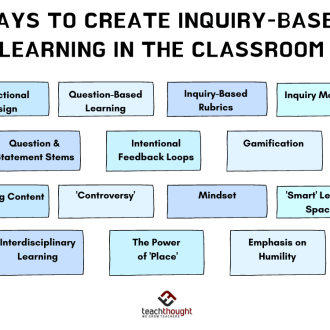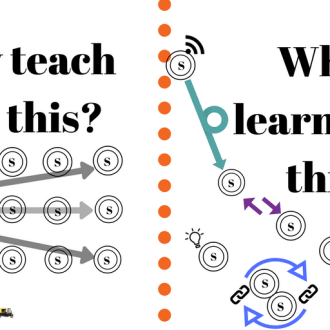
7 Best Articles on Teaching
The most useful articles on teaching from around the web, curated by thought leaders and our community.
Refind focuses on timeless pieces and updates the list whenever new, must-read articles or videos are discovered.
Top 5 Teaching Articles
At a glance: these are the articles that have been most read, shared, and saved on teaching by Refind users in 2024 so far.
What is ...?
New to #teaching? These articles make an excellent introduction.
What Is Culturally Responsive Teaching?
Here's what it means to be a culturally responsive teacher and where critical race theory ties in—or not.
«While more than half of public school students are students of color, most schools are organized around the mainstream culture of white Americans. The culture that many students experience at home and in their communities is not always represented at school—or is represented in a stereotypical way.»
Short Articles
Short on time? Check out these useful short articles on teaching—all under 10 minutes.
Feynman Technique
Feynman Technique (coined after techniques used by physicist Richard Feynman) mental model allows one to learn by teaching someone else a topic in simple terms.
The Feynman Technique 2.0: How to Take Learning to the Next Level
A deep dive into the Feynman Technique, a method designed to learn through teaching. How can we upgrade it with a few teaching principles?
«This distinguishes it from a static memorisation of facts. That being said, there’s still room for improvement. The Feynman Technique 2.0»
The Collapse Of American Teaching
Teachers all over the country describe problems that touch every aspect of our culture and society, from technology dependence to stats-obsessed bureaucracy to a post-COVID behavior crisis.
It’s easy to do (if you know how to do it)
This is the dilemma that every game designer, form creator and teacher faces. Writing an instruction manual, doing a survey, creating a map–they’re all difficult tasks because of the tr…
14 Effective Teaching Strategies For Inquiry-Based Learning
One obvious way to promote inquiry learning in your classroom is to design lessons and units that benefit from, promote, or require it.
«“children want to understand the world around them, and naturally reveal their interests by asking questions – sometimes even too many questions! As educators, we may feel pressure to keep going with our intended lesson plan or to get to our ‘point.’”»
Long Articles
These are some of the most-read long-form articles on teaching.
After 100 Years of the Same Teaching Model It’s Time to Throw Out the Playbook
In looking back at my parents’ education in the 1950s and 60s, and my own education in the 1990s and 2000s, I worry sometimes that despite the huge advances that we’ve seen in technolog…
What is Refind?
Every day Refind picks the most relevant links from around the web for you. Picking only a handful of links means focusing on what’s relevant and useful.
How does Refind curate?
It’s a mix of human and algorithmic curation, following a number of steps:
- We monitor 10k+ sources and 1k+ thought leaders on hundreds of topics—publications, blogs, news sites, newsletters, Substack, Medium, Twitter, etc.
- In addition, our users save links from around the web using our Save buttons and our extensions.
- Our algorithm processes 100k+ new links every day and uses external signals to find the most relevant ones, focusing on timeless pieces.
- Our community of active users gets the most relevant links every day, tailored to their interests. They provide feedback via implicit and explicit signals: open, read, listen, share, mark as read, read later, «More/less like this», etc.
- Our algorithm uses these internal signals to refine the selection.
- In addition, we have expert curators who manually curate niche topics.
The result: lists of the best and most useful articles on hundreds of topics.
How does Refind detect «timeless» pieces?
We focus on pieces with long shelf-lives—not news. We determine «timelessness» via a number of metrics, for example, the consumption pattern of links over time.
How many sources does Refind monitor?
We monitor 10k+ content sources on hundreds of topics—publications, blogs, news sites, newsletters, Substack, Medium, Twitter, etc.
Can I submit a link?
Indirectly, by using Refind and saving links from outside (e.g., via our extensions).
How can I report a problem?
When you’re logged-in, you can flag any link via the «More» (...) menu. You can also report problems via email to hello@refind.com
Who uses Refind?
450k+ smart people start their day with Refind. To learn something new. To get inspired. To move forward. Our apps have a 4.9/5 rating.
Is Refind free?
Yes, it’s free!
How can I sign up?
Head over to our homepage and sign up by email or with your Twitter or Google account.
Keep Learning
Get the big picture on your favorite topics.






